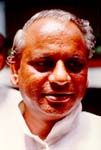The Rediff Interview/Kalyan Singh
'The BJP-BSP is one of the most lethal political combine'
 Senior BJP leader Kalyan Singh, who is not only a former Uttar Pradesh chief minister but also the chief minister-in-waiting thanks to his party's agreement with the Bahujan Samaj Party for power-sharing in the state, is not his aggressive self these days.
Senior BJP leader Kalyan Singh, who is not only a former Uttar Pradesh chief minister but also the chief minister-in-waiting thanks to his party's agreement with the Bahujan Samaj Party for power-sharing in the state, is not his aggressive self these days.
The man, who shot into the spotlight for his alleged role as chief minister during the Babri Masjid demolition in Ayodhya in 1992, initially opposed the alliance with the BSP. Contending that this would only benefit the latter, he had recounted how the backward class party doubled its voter base to 20 per cent after ruling the state with the BJP's support for just four months in 1995.
Though he seems restrained these days, Singh gave enough clues about his smouldering discomfiture with the alliance in an exclusive interview to Sharat Pradhan in Lucknow. Excerpts:
What finally led you to accept the alliance with BSP, which you opposed vehemently until not very long ago?
President's rule had taken UP into a state of anarchy. The deteriorating law and order situation made the lives of 14 crore people miserable. Corruption became rampant under Governor Romesh Bhandari, who began to act like an agent of Samajwadi Party president and Union Defence Minister Mulayam Singh Yadav.
So you mean to say it was the fear of Mulayam Singh Yadav that brought you together?
We had reliable information that Mulayam was trying to get the
assembly dissolved to order elections in October, by which time he would have his men in key administrative and judicial slots like superintendents of police and magistrates. The BSP too realised the gravity of the situation and we decided to forge this coalition, dissolving all differences. Even the BSP was earlier insisting on outside support.
Do you mean to say that magistrates and SPs can really influence an election?
Surely, they can to a large extent.
The present Mayawati government too is indulging
in large-scale transfer of bureaucrats and police officials. Does it have designs of rigging the next election?
Transfers and postings are a discretion of a chief minister.
I would not like to make any comment.
Do you agree with Mayawati's endless transfers without a policy or norm?
I repeat, any comment from my end would amount to encroaching upon the chief minister's domain, even though I would agree that the policy should be laid down. But it is wrong to blame only the person at the top. The bureaucracy in UP is so badly aligned on caste and even political lines that it has itself to blame to a large extent.
But why did you not indulge in mass transfers when you became the chief minister?
Yes, it is true that I did not order any large-scale administrative
reshuffle. Perhaps my experiment of taking work from the same
set of officials proved right. But that may not always be so. My
logic is to stick purely to merit -- reward the good officers and
punish the bad ones and keep the system as transparent as possible.
But then every chief minister has the right to function the way s/he desires.
Would you need another major reshuffle when you become the chief minister after Mayawati's six-month tenure, as per the terms of your coalition?
Ask me when the time comes.
But how come you agreed to give BSP an equal share in governance when its numerical strength was nearly one-third of the BJP's (against BJP's 176, BSP has only 67)?
(Pauses) Life is full of compromises and so is the case
with politics. In this case we never made it an issue, though sharing power does not go with BSP's slogan, jitni
jiski sankhya bhari, utni uski bhagedaari (numerical
strength should determine one's share in power). But now that
we are together, it is the responsibility of both of us to ensure that this novel experiment succeeds. None of us should utter a word that might lead to misunderstandings.
But your ideologies are so different that a clash might become inevitable?
Our ideology may be different, but there are several fundamental issues on which we are one. If we can keep this alliance going, it will be one of the most lethal political combines. The country's destiny -- not just the state's -- hinges on the success of this experiment. If we fail, people will not pardon us.
What about Mulayam Singh's charge that the BJP-BSP coalition government was formed with foreign money?
As the allegation has been levelled by a person no less than the defence minister of the country, a high-level probe should be ordered. If the charge is proved, we must quit. Otherwise, he owes an apology to the nation. It is high time Mulayam rose above petty politics and stopped making wild allegations.
 Do you think the BJP-BSP alliance would have been unnecessary if the governor had allowed you to form the government, accepting your plea that the single largest party should be allowed to do so?
Do you think the BJP-BSP alliance would have been unnecessary if the governor had allowed you to form the government, accepting your plea that the single largest party should be allowed to do so?
That's a different story. Of course we would have formed the government on our own then. But in utter violation of constitutional provisions, Governor Bhandari insisted that we first prove our strength before him in Raj Bhavan.
Would some reforms ensure that such incidents don't recur?
It would be apt to bring governors under the purview of parliamentary
impeachment. When the Constitution provides for impeachment of the President and Supreme Court judges,
why should governors enjoy this kind of immunity?
It is said that ties with the BSP have made the BJP more acceptable, which was otherwise considered a political untouchable.
It was certainly a slap on the face of those who tried to brand the
BJP as an untouchable. You see, we have already aligned with the Shiv Sena in Maharashtra, with the Akali Dal in Punjab, with the Samta Party in Bihar and with the BSP in UP. I am confident that more parties will come forward soon to join hands with the BJP.
Tell us what you think of this interview
|





